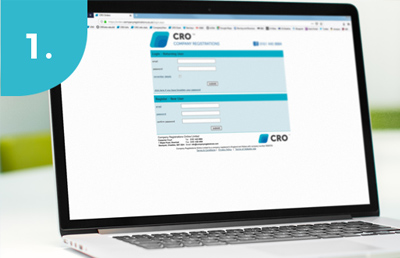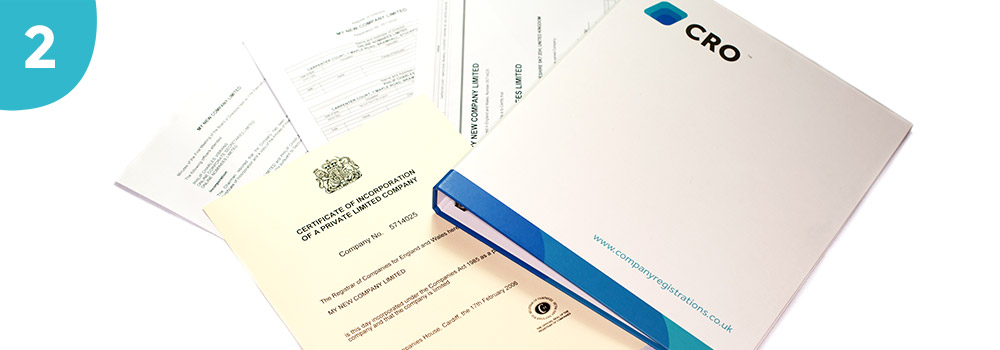We offer clear considered advice on setting up your company and ALL our company formation packages are fully completed with bespoke Articles of Association, statutory registers, first minutes and share certificates all completed upon incorporation.
Check your company name and order now:
Company Formation Services
Setting up a Limited Company is the best way to define your brand, own everything you do, and run a business in the most tax-efficient way possible.
All UK companies are registered through Companies House. At CRO, our company formation services ensure that your Limited Company is correctly established. Using our search tool, you can find out straight away whether your chosen company name is available or contains any sensitive words or expressions. Once you’ve selected your company name, all you need is the address of your registered office, director information and shareholder information and then we can help you complete your registration in no time at all.
Limited Company Formation UK
With CRO, we offer a number of company formation packages that simplify the whole process and make it more manageable.
You can choose from our email formation, printed formation or our all-inclusive service.
With CRO, it couldn’t be easier to form a limited company with our company formation services.
All your legal requirements completed – choose from:






At CRO we take pride in a professional limited company formation service. Aimed at customers who appreciate the value of first class service and the importance of having their limited company set up so that it is fully compliant with the Companies Act.
The following gives a brief guide to the various types of companies that can be incorporated in the UK and their various principal characteristics. We can incorporate any of these company types for you and provide advice on the most appropriate entity if your business does not suit a standard private company.
More detailed information can be found in our support and information guides. Click here to download.
We also offer company registration packages, to make your company formation process all that more manageable..
- The most common Private Limited Company suitable for most trading businesses
- Normal commercial trading purposes
- Objects unrestricted
- Can undertake any nature of business
- Can operate anywhere in the world
- Officers and shareholders can be resident anywhere and of any nationality
- Members have limited liability
- Can have a sole director and sole shareholder
- Limited companies are often advantageous for their shareholders regarding taxation
- Incorporated within hours
- Own choice of name
- As above but registration number available immediately upon receipt of payment
- Takes longer to complete registration of new directors and transfer shares to new owners
- More expensive
- Restricted choice of name but this can be changed
- Non-profit corporate entity – assets or financial surplus cannot be distributed to members
- A Guarantee company is not owned by its members and cannot be transferred by its members for value – it has no share capital
- Suitable for clubs, membership organisations, sports associations etc
- Can apply for charitable status
- Members have limited liability
- Can be incorporated in most circumstances within hours
- Some input required from client to establish main objects if required or objects can be unrestricted
- Necessary if the company is to trade its shares to the public
- Can undertake any nature of business
- Can operate anywhere in the world
- Members have limited liability
- Can be incorporated in most circumstances within hours
- Own choice of name
- High initial capital commitment
- Must have at least two directors and one shareholder
- A private company can be converted to a PLC, so many PLCs start life as normal private companies and convert at a later date prior to flotation on the stock markets
- Suitable for new and existing partnerships wishing to obtain limited liability status, and aimed particularly at professional partnerships such as accountancy and solicitors firms
- Maintains tax status of a partnership
- Members have limited liability
- Can be incorporated in most circumstances within hours
- Suitable for most commercial business activities
- May be either a company limited by shares or a company limited by guarantee
- Beneficial for property developers planning to sell flats or apartments in a development once completed
- Can be used to spread the freehold of a number of flats across the individual owners allowing easy transfer and sale of each flat
- Can be used purely as a vehicle to manage the maintenance of a property comprising of several flats or apartments
- Company formation limited by guarantee
- Allows leaseholders to purchase freehold properties or acquire the rights to manage a property under the Commonhold and Leasehold Reform Act 2002
- Applies where a building is sub-divided into two or more flats or tenancies
- Uses prescribed Articles of Association
- Can be either limited by shares, limited by guarantee or a public company
- Intended for use by social enterprises wishing to use their profits and assets for public benefit
- Requires approval from the CIC Regulator before incorporation
- Cannot have charitable status
Frequently Asked Company Formation Questions
In general, you can choose any name you want for your company, but there are several regulations that can affect your choice. For example, a company name must end with the words ‘Limited’, ‘Public Limited Company’, or ‘Limited Liability Partnership’ or the appropriate abbreviations LTD, PLC, LLP or Welsh equivalents. Companies limited by guarantee may apply for exemption from using the word Limited. We will always check your name before submitting any application to the Registrar and you can check your choice of name before submitting to us as part of our application process. A name cannot be used if:
- It is the same as a name already on the index
- It includes the words limited, unlimited, and public limited company anywhere except at the end of the name. This applies equally to abbreviations or the Welsh equivalent of the words
- It is offensive
- Its use would be a criminal offence
- A private company must have at least one director
- There is no limit to the number of directors allowed
- There must be at least one “real person” listed as a director, therefore it is not permissible for a company to have a sole corporate director
- Directors can be individuals or corporate bodies (subject to the above)
- The directors are responsible for the management and day to day operation of the company and have a duty to be aware at all times of the company’s financial situation
- Any or all of the company’s directors can be resident anywhere in the world and can be of any nationality
One of the most frequently asked questions we hear “what is the usual share structure for a new company”. There is no strict formula to follow. In simple terms, the shareholding of a company determines its ownership, and this is usually structured very easily. If your company is to be wholly owned by yourself, you need only have a single share issued in your name, to begin with.
- There must be at least one shareholder in a company at all times
- A company can have any number of shareholders
- Shareholders are often referred to as Members of the company o Sole shareholders are allowed in private companies
- There is no stamp duty payable on allotments of new shares, but stamp duty can be payable in many circumstances when transferring shares from one shareholder to another
- Shareholders can be residents anywhere in the world and can be of any nationality
- The number of shares that can be issued in a company or to specific shareholders is unlimited unless restricted by the articles
- A shareholder is personally liable for the nominal value of any shares registered to him/her that remain unpaid at the date of any administration or winding up of the company
All UK companies and LLPs must maintain a Register of People with Significant Control (PSC Register) which, along with other statutory registers must be made available to public inspection upon request.
Introduced in April 2016, PSC legislation constitutes one of the most important and complex pieces of new company law introduced in the UK for many years. The legislation is designed to improve the transparency of corporate ownership for UK-registered companies. It encompasses all companies incorporated under the Companies Act 2006, hence it applies to private and public companies, LLPs, companies limited by guarantee (whether or not registered with the Charity Commission) and Community Interest Companies. A major effect of this relatively new regime will be that it will clearly become virtually impossible to maintain any degree of secrecy behind the ownership of shares where a shareholder owns over 25% of the capital of a company, and failure to disclose PSC details is a criminal offence.
Definition of People with Significant Control A PSC is an individual who meets one or more of the following conditions:
- An individual who holds more than 25% of shares in the company
- An individual who holds more than 25% of voting rights in the company
- An individual who holds the right to appoint or remove the majority of the board of directors of the company
- An individual who has the right to exercise, or actually exercises, significant influence or control over the company
- Where a trust or firm would satisfy one of the first four conditions if it were an individual, any individual holding the right to exercise, or actually exercising, significant influence or control over the activities of that trust or firm
The registered office address recorded at Companies House, provides a point of contact for correspondence from sources such as Companies House itself, HM Revenue and Customs and other authorities or third parties wishing to make formal contact with the company.




